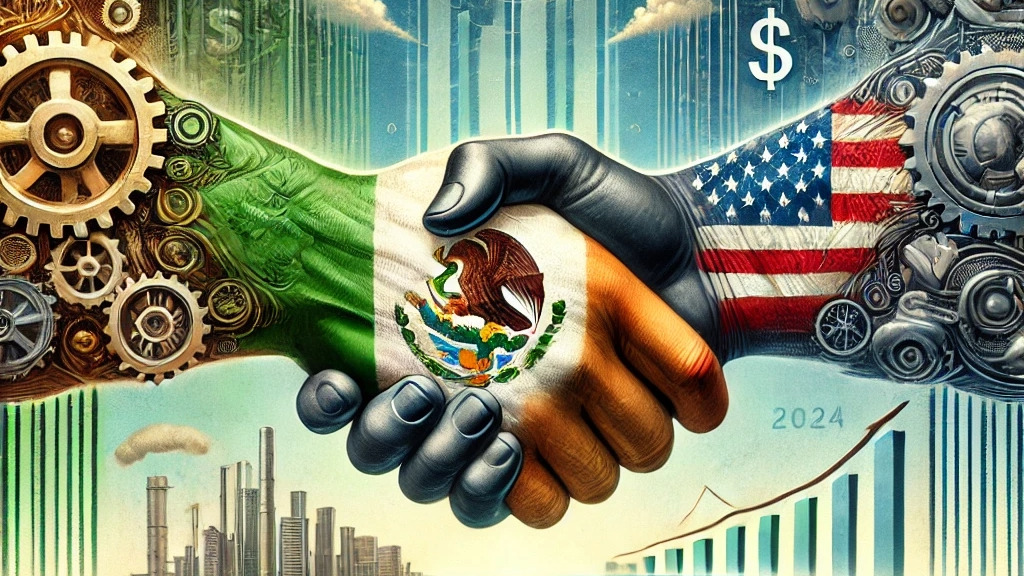Mexico breaks foreign trade record with the United States

Mexico has achieved a record 15.9% share of U.S. foreign trade during the first nine months of 2024, reaching a value of $632.29 billion, according to U.S. Census Bureau data.
This positioning consolidates Mexico's position as the main exporter of products to the United States and as the second largest destination for U.S. exports, a position it occupies ever closer to Canada, the leader in this field.
This figure reflects the strengthening of the economic relationship between the two countries and the positive impact of regional integration driven by the Mexico-U.S.-Canada Agreement (T-MEC), which has accelerated cooperation in strategic sectors such as automotive, electronics and household appliances.
In terms of growth, Mexican exports to the United States during this period reached US$378.885 billion, an increase of 6.5% year-over-year, while U.S. exports to Mexico totaled US$253.405 billion, an increase of 4.2%.
This dynamism is in contrast to the United States' other two major trading partners, Canada and China, which have shown a decline in market share.
With the combined contribution of Mexico and Canada accounting for nearly one-third of U.S. goods trade, Mexico has overtaken China as its largest trading partner, a position not seen for two decades.
This leadership presents important strengths for the Mexican market. Mexico stands out as a reliable and close trading partner for the United States, which benefits its companies by offering them a strategic location, competitive production costs and a supply chain that has evolved to respond more quickly and efficiently to the demands of the U.S. market.
These advantages are critical in advanced manufacturing and high-tech assembly sectors, such as automotive and electronics, which require suppliers capable of adapting quickly to changes in demand and international regulations. The binational relationship has spurred the development of production and distribution centers near the border, strengthening Mexico's presence as a logistics and manufacturing hub.
However, this growth brings with it certain weaknesses for the Mexican market, especially in terms of trade dependence on the United States, which could cause the Mexican economy to be affected by changes in U.S. trade policies or fluctuations in the neighboring country's economy.
In addition, as Mexico increases its participation in the supply chain of complex products, it faces the challenge of raising its standards of quality, labor training and production technology to compete with suppliers from other regions, such as Asia, who are also seeking to remain attractive options despite their remoteness.
The opportunities for Mexico in this context are vast. With the trend of nearshoringAs a result, many U.S. companies have begun to relocate their operations to North America to minimize the risks of an extensive and volatile supply chain.
This is particularly favorable for Mexico, which can attract new investment in manufacturing and technology sectors, increasing employment and accelerating infrastructure development in key areas. Geographic proximity and the T-MEC framework allow Mexican companies to offer faster delivery times and respond flexibly to U.S. market requirements, positioning them favorably vis-à-vis competitors in Asia and other regions.
However, there are threats that Mexico must consider. The proximity and openness of the Mexican market makes it exposed to trade and political tensions that may arise between Mexico and the United States, especially in the context of political campaigns where trade and migration are often priority issues.
A change in the U.S. administration or in its approach to the T-MEC could change the conditions under which Mexican companies currently operate, potentially limiting the benefits offered by the agreement.
In the global scenario, competition with China continues to be a challenge for Mexico, as the Asian giant maintains an important position in world trade and continues to develop strategies to adapt to new consumption and production trends. Although Mexico has managed to temporarily take advantage, diversifying the economy and reducing dependence on traditional sectors will be key to facing competition with Asia and other emerging countries in the long term.
Mexico's strong trade relationship with the United States opens up new possibilities, but it also requires Mexican companies to have the capacity to innovate and adapt in order to remain competitive in a changing environment.
The current context provides Mexico with a unique opportunity to consolidate its position in U.S. foreign trade and build on the strengths that this relationship offers, while facing the challenges with diversification strategies and investment in infrastructure and human capital.
The evolution of this trade relationship will be critical to the growth and stability of the Mexican market in the years to come, and its success will depend largely on the ability of Mexican companies and the Mexican government to adapt to the global and regional circumstances that shape this environment.
Collaboration: Editorial Auge.





